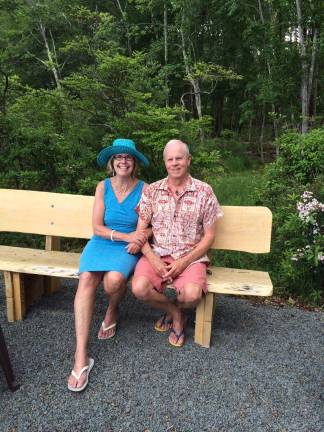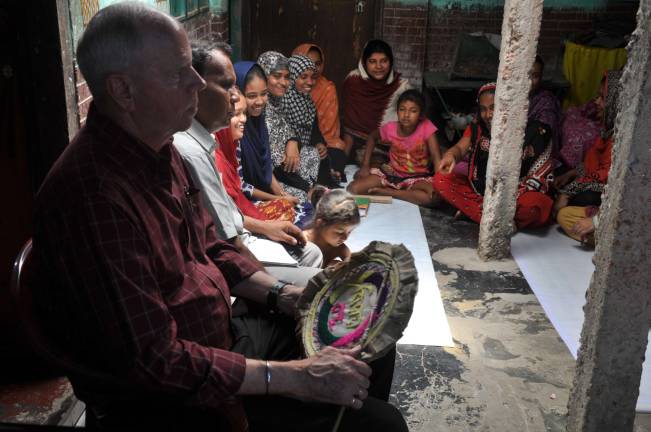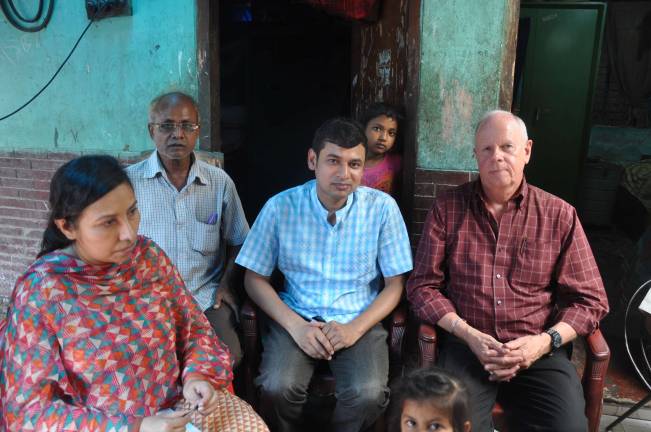After world odyssey, a couple comes back home



By Linda Fields
SHOHOLA — Many of us dream of visiting exotic places, and might even get to go on an occasional trip. But Barbara Thomsen and Edson Whitney took no half-measures.
They decided “to throw caution to the wind” and dedicate an entire year to traveling the world.
“We left with five thousand dollars and a pouch," Edson said.
That was in 1975, when the couple married and took their savings on the road with them. They didn’t know that half their marriage would be spent living abroad, working in nearly two dozen countries covering four continents.
Barbara and Edson met as teachers back in the mid-70s. Edson grew up in Port Jervis and taught there. Barbara, whose family owned property in Shohola, taught in Milford and Florida, N.Y. At first, they took advantage of their summer vacations to do something they both loved: travel. As it turned out, that became more of a lifestyle than a temporary diversion.
And sometimes, when you take the road less traveled, you wind up exactly where you began.
The first stepWithout a specific itinerary, the couple began the year in Europe, visiting Paris and Amsterdam and making their way to the Greek isles and much of Africa — even hiking Mount Kilimanjaro. After more than nine months living out of their backpacks, they each landed a contract teaching jobs in Swaziland, where they lived for the next two years. Their next jobs brought them to Thailand for another two years, and then to Indonesia to train native teachers to teach English to Cambodian and Vietnamese refugees that had been accepted for resettlement in the United States.
“We lived in a godforsaken little island on the equator in a nine by twelve room,” said Edson. “It was the best job we ever had."
In fact, the couple is still in touch with one of the refugees they first encountered there.
“I opened up a Facebook page for refugees one day, and there was a picture of me and Barbara from 1981," Edson said. “There was a question with it — ‘Does anyone know these people?’”
The former refugee remembered the couple giving him a five-dollar bill and a Bee Gees tape when he was 14 years old. He's now in California with three children of his own and is doing well, Edson said.
Career and familyEdson is most proud of his work in Dhaka, setting up the Bangladesh Center for Communication Programs. By that time, 1991, he had a masters degree from Cornell and was employed by Johns Hopkins Bloomberg School of Public Health Center for Communication Programs. The mission was to help promote social and behavioral change that would result in more democracy, better health for children, and the elimination of human trafficking and HIV, among other changes.
“I was the only non-Bangladeshi," Edson said. "My goal was to work myself out of a job, but we worked Johns Hopkins out of a job. We helped create the Bangladesh Center for Communication Programs. Today, they are the only development communication organization in Dhaka with 100 staff and my deputy is the head of it. They sub-contract us now. They’re doing great work.”
As a mother with two young sons, Barbara felt Dhaka was good for the family.
“It was wonderful," she said. "Our sons were educated there during their formative years, and they learned so much from that experience. Their teachers were British, Indian and Bengali. They took them on incredible educational field trips.”
Barbara recalled that her son Chris was quite unhappy to learn the family would be moving back to the states before he could go on the 8th grade field trip: a trek to Nepal.
Returning homeBack in the U.S., Barbara earned a masters degree in organization development work and has consulted on management systems in public health organizations. Her work has been contracted by the Ford foundation, UNICEF, and the World Bank, to name a few. Edson consults on crises like the Ebola outbreak and was recently in Sierra Leone and other African nations helping them establish best practices to fight the disease.
“Since I ‘retired,' I’ve been to Bangladesh three times working on a national communication strategy for directing people to non-government clinics for maternal and child health care," said Edson.
The couple is happy to be settling down in Twin Lakes — where they both have roots. And, looking back, Edson said, “For us, it’s been a great life and a great experience. We are back where we started now — amader bari.” That's the English transcription for the Bangla term “our native place,” and is appropriately the name the Edsons gave to their home in Shohola.